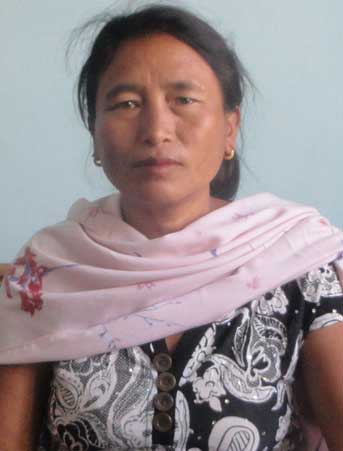
Ms Neikhochong Kuki, age 42 is a single mother whose husband has left her for another woman soon after the birth of her child. She single handedly raise her son who is now 18 years old without any support from his father. Originally hailing from Pallel, a small hamlet situated closed to Burma border, she was forced to fled for safety during ethnic violence in 1992 as her village was burnt down. She and her whole neighborhood fled to Churachandpur district, As a single mother and internally displaced, her life is a story of struggle. There are many days when she find it difficult to make daily food requirements. She is engaging in small business (Moreh trade along Indo-Burma border) for her livelihood. She sells clothes and other commodities imported from china for a little commission which is a general livelihood practice of many other women who are internally displaced, gun widows, and other women directly affected by violence and conflict. Women are most vulnerable in this kind of economic activities because of the illegal trades and conflict going on in the golden triangle. At present she’s no longer engage in moreh trade, but runs a small variety shop in the village. She lives in Canaan veng,a quiet locality at the outskirt of Lamka town in her own small homestead land which she got as gift from her brother. In return she takes an additional responsibility of taking care of her aged mother and her brother’s children
Neikhochong is a local women leader. Her personal experience as victim of gender violence and victim of ethnic and armed conflict in border region has made her mentally strong. Her thirst for peace and democracy is much stronger and bigger than most ordinary women in her community. Her education (under graduate / X11 Passed) enable her to become amongst the first women local church Auditor and church deacon board members under evangelical church of India. She leads the women self help groups in her neighborhood and act as women mobilizer in her community. She shared her experience on women and militarism; “last year, there was misunderstanding between an armed insurgent and local young boys in her neighborhood. The armed insurgent has beaten up young guys at midnight. Upon hearing the noise, I felt obligated to intervene; I went out of my house in the middle of the night, made an appeal to the armed group to stop violence but they did not listen to me. Later when they left with other few women we clean up the wounds of the boys who were seriously beaten up and took them to their home. She added, we, women often are physically participating for peace in a most risky situation, yet nobody has recognize what we have done. I risked my life on the night when there was a fight in my neighborhood last year but nobody seems to recognize. A peace talk was held on the issue after a week between Tribe Union leader, the victim families and the armed group but women don’t have space in there. When asked if she’s discourage in her work for peace building, she said ’I am not discourage, I will continue the peace initiative work as long as my son career and the family livelihood is not at stake.”
She shared her difficulties as a women leader; as single mother and bread earner of the family. Her pathetic conditions posed a difficulty to give enough time for social and development activities. However, she said, “if I m a little economically secure than I would have done more of mobilizing women, attending meetings, workshops, travelling and other religious activities. I am looking forward when my son can start earning so that I can devote more of my time for peace and for women.” She added, “at the initial stage of Women in Governance Program, I was not so excited to actively involve. I have attended Gender TOT, Lobby and Advocacy TOT and many other workshops and meetings. However, only after attending Local Capacity for peace, I was so moved and now I am interested in all RWUS/WinG programs and decided to take part in as many as I can.”
Neikhochong participated in WinG State level exposure and experience sharing held at Chandel District in Nov 2011. That was the first time she visited her home place after the ethnic violence 19 years ago. She was emotional and sad but also glad that she has an opportunity to visit after a long gap. She wished that WinG promoters in the district has a capital fund to engage more effectively for peace and development. She said, “Alone we could do so little. The only way out for women to be in governance and engage in social and development aspect is to be in organized form and take a joint venture.”
